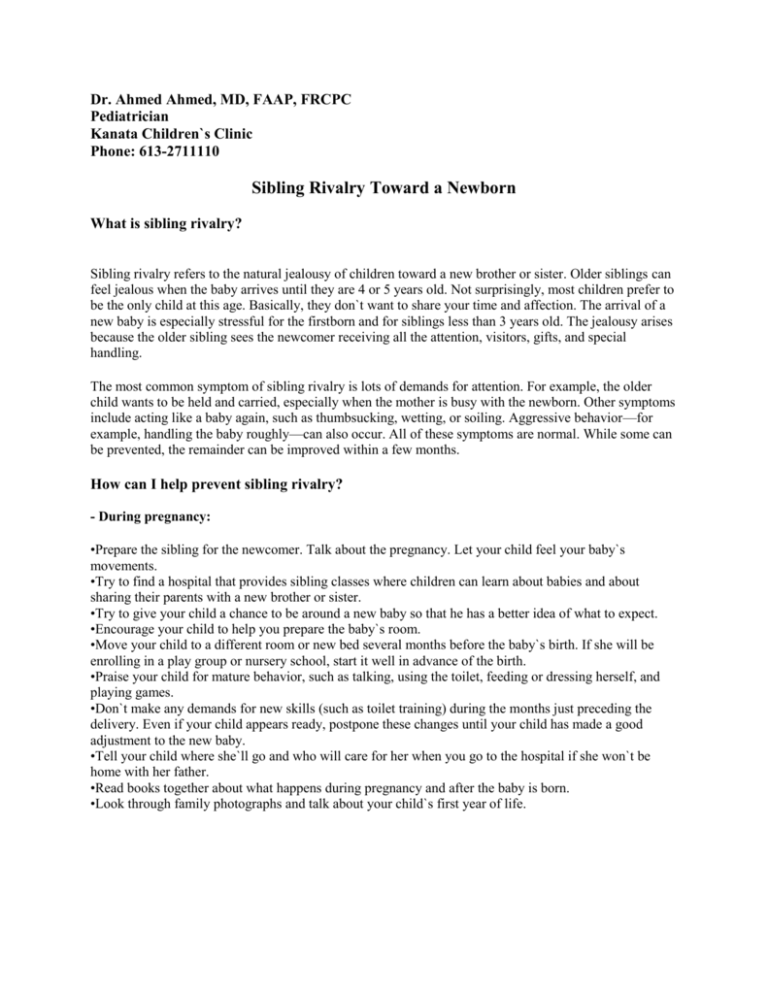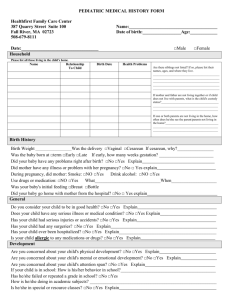
Dr. Ahmed Ahmed, MD, FAAP, FRCPC
Pediatrician
Kanata Children`s Clinic
Phone: 613-2711110
Sibling Rivalry Toward a Newborn
What is sibling rivalry?
Sibling rivalry refers to the natural jealousy of children toward a new brother or sister. Older siblings can
feel jealous when the baby arrives until they are 4 or 5 years old. Not surprisingly, most children prefer to
be the only child at this age. Basically, they don`t want to share your time and affection. The arrival of a
new baby is especially stressful for the firstborn and for siblings less than 3 years old. The jealousy arises
because the older sibling sees the newcomer receiving all the attention, visitors, gifts, and special
handling.
The most common symptom of sibling rivalry is lots of demands for attention. For example, the older
child wants to be held and carried, especially when the mother is busy with the newborn. Other symptoms
include acting like a baby again, such as thumbsucking, wetting, or soiling. Aggressive behavior—for
example, handling the baby roughly—can also occur. All of these symptoms are normal. While some can
be prevented, the remainder can be improved within a few months.
How can I help prevent sibling rivalry?
- During pregnancy:
•Prepare the sibling for the newcomer. Talk about the pregnancy. Let your child feel your baby`s
movements.
•Try to find a hospital that provides sibling classes where children can learn about babies and about
sharing their parents with a new brother or sister.
•Try to give your child a chance to be around a new baby so that he has a better idea of what to expect.
•Encourage your child to help you prepare the baby`s room.
•Move your child to a different room or new bed several months before the baby`s birth. If she will be
enrolling in a play group or nursery school, start it well in advance of the birth.
•Praise your child for mature behavior, such as talking, using the toilet, feeding or dressing herself, and
playing games.
•Don`t make any demands for new skills (such as toilet training) during the months just preceding the
delivery. Even if your child appears ready, postpone these changes until your child has made a good
adjustment to the new baby.
•Tell your child where she`ll go and who will care for her when you go to the hospital if she won`t be
home with her father.
•Read books together about what happens during pregnancy and after the baby is born.
•Look through family photographs and talk about your child`s first year of life.
- In the hospital:
•Call your older child daily from the hospital.
•Try to have your older child visit you and the baby in the hospital. Many hospitals will allow this.
•If your older child can`t visit you, send her a picture of the new baby.
•Encourage Dad to take your youngster on some special outings at this time (for example, to the park,
zoo, museum, or fire station).
- Coming home:
•When you enter your home, spend your first moments with the older sibling. Have someone else carry
the new baby into the house.
•Give the sibling a gift "from the new baby."
•Ask visitors to give extra notice to the older child. Have your older child unwrap the baby`s gifts.
•From the beginning, refer to your newborn as "our baby."
- The first months at home:
•Give your older child the extra attention he needs. Help him feel more important. Try to give him at least
30 minutes a day of exclusive, uninterrupted time. Hire a baby sitter to care for the baby and take your
older child outside or look through his baby album with him. Make sure that the father and relatives spend
extra time with him during the first month. Give him lots of physical affection throughout the day.
•When you are busy attending to the baby, try to include your older child by talking with him. When you
are nursing or bottle-feeding the baby, read a story, play a game, or do a puzzle with your older child.
•Encourage your older child to touch and play with the new baby in your presence. Allow him to hold the
baby while sitting in a chair with sidearms. Avoid such warnings as "Don`t touch the baby." Newborns
are not fragile and it is important to show your trust. However, you can`t allow the sibling to carry the
baby until he reaches school age.
•Enlist your older child as a helper. Encourage him to help with baths, dry the baby, get a clean diaper, or
find toys or a pacifier. At other times encourage him to feed or bathe a doll when you are feeding or
bathing the baby. Emphasize how much the baby likes the older sibling. Make comments such as "Look
how happy she gets when you play with her," or "You can always make her laugh."
•Don`t ask the older siblings to be quiet for the baby. Newborns can sleep fine without the house being
perfectly quiet. Asking your older child to do this may cause him or her to resent the baby.
•Accept baby-like behavior, such as thumbsucking or clinging, as something your child needs to do
temporarily. Do not criticize him.
•When your child behaves aggressively, stop him right away. Tell him, "We never hurt babies." Send
your child to "time-out" for a few minutes. Don`t spank your child or slap his hand at these times. If you
hit him, he will eventually try to do the same to the baby as revenge. For the next few weeks don`t leave
the two of them alone.
•If your child is old enough, encourage him to talk about his mixed feelings about the new arrival.
Suggest an alternative behavior: "When you`re upset with the baby, come to me for a big hug."
When should I call my healthcare provider?
Written by B.D. Schmitt, MD, author of "Your Child`s Health," Bantam Books.
Published by RelayHealth.
© 2011 RelayHealth and/or its affiliates. All rights reserved.








